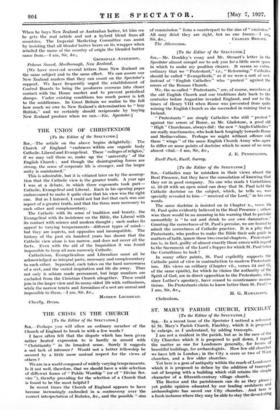[To the Editor of the SPECTATOR.]
Sta,—Catholics may be mistaken in their views about the Real Presence, but they have the consolation of knowing that they err in good company. No one* who reads 1 Corinthians xi. 23-29 with an open mind can deny that St. Paul held the Catholic doctrine on the subject, which, he tells us, was specially revealed to him—" received of the Lord," in his own words.
The same doctrine is insisted on in Chapter x., verse 1G. St. Paul quite evidently believed in the Real Presence ; other- wise there would be no meaning in his warning that to partake unworthily is " to eat and drink to our own damnation." Granting the correctness of St. Paul's premise, we are bound to admit the correctness of Catholic practice. It is a pity that Protestants, who profess to make the Bible their sole guide in matters of faith, ignore these two crucial chapters. Protestant- ism is, in fact, guilty of almost exactly those errors with regard to the Sacrament of the Lord's Supper for which St. Paul takes the Corinthians to task !
In many other points, St. Paul explicitly supports the Catholic point of view in contradiction to modern Protestant- ism. His views on celibacy (Chapter vii., verses 34 and 35, of the same epistle), for which he claims the authority of the Spirit of God, are in direct opposition to the Protestants, who, since Luther's apostacy, have ceased to countenance monas- ticism. Do Protestants claim to know better than St. Paul ?— I am, Sir, &c.,














































 Previous page
Previous page